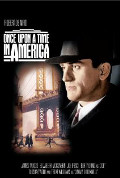
Directed by
Sergio Leone
220 minutes
Rated R
Reviewed by
Bernard Hemingway

Once Upon A Time in America
Based on a novel, 'The Hoods', by Harry Grey, Sergio Leone's gangster epic was worked on by a team of scriptwriters including Leone and apparently Federico Fellini. The result is a sprawling, elegiac epic that rambles over a near 4 hour running time. Butchered for US release being cut down to 137 minutes, the version reviewed here is still not the complete film (the original Italian version is credited with a 238m run time) and there are evident questions left unanswered in this version such as who were the mobsters pursuing Noodles (Robert De Niro) in the early part of the film and what happened to Joe Pesci's character, Frankie? As for the rather vaguely adumbrated politics and organized crime connection, well that simply evaporates, the film, unlike Leone's 1968 masterpiece, Once Upon A Time In The West, failing to bear out its title's ambitions.
Whilst the full version is still considerably less than the 536m total of the Coppola/Puzo Godfather trilogy, admittedly spread overthree films, to which this will be inevitably compared, Leone's saga sags under the weight of its detailed and unnecessarily protracted exposition. I am not a great fan of Coppola's handling of Don Corleone's backstory in The Godfather Part II with the casting of De Niro as Al Pacino's father, but Leone's equivalent makes it look very good, his protracted account of Noodle's adolescent years with the very ordinary Scott Tiler as the young Noodles is painfully overlong. Whilst De Niro is the paradigmatic screen mobster of this era and does an excellent job, particularly with his aged incarnation, as a Jewish mobster he brings nothing distinctive to the role and the pairing of De Niro with James Wood is also mis-judged, with the former making an unlikely second banana to the latter. In general, the script defines neither the main characters nor their relationships convincingly, once again coming a poor second to The Godfather films.
The production, however, is gloriously excessive with some wonderfully staged sequences, superbly lensed by Italian A-list cinematographer, Tonino Delli Colli, knocking other front-runners in these stakes into a cocked hat. The near-kitsch accumulation of decorative detail and the interminably drawn out scenes not only fail to conceal but exacerbates the failure of the narrative to capture the desired sweep of time.
Want something different?





